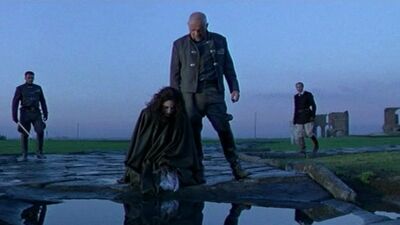Based on Shakespeare’s last and bloodiest tragedy—and a play that some consider to be more trouble to adapt and more off-putting to audience than it’s worth to mount—”Titus” was a great example of a filmmaker expending the artistic capital they’d accrued on a very successful commercial project to make something that was expensive but challenging. It was the feature film debut of writer and director Julie Taymor, who was then hot off the Broadway spinoff of “The Lion King,” which completely upended expectations of a soulless “intellectual property” cash grab by delivering a visually imaginative musical filled with splendid costumes, puppetry, and set design.
The show made a staggering amount of money, swept the Tony awards for Disney, and arguably reinvented Broadway’s identity along the way, in more or less the same way that the success of the original “Star Wars” reinvented Hollywood blockbusters. Taymor turned around and spent $18 million of 20th Century Fox’s money on “Titus,” which is probably the closest Hollywood has ever gotten to the sorts of gory, sexually explicit, “Who am I supposed to root for here?” pieces that made English directors like Peter Greenaway and Derek Jarman into art house objects of argument in the earlier part of the decade. A hornet’s nest of intrigue, “Titus” revolves around the eponymous Roman general, who has just returned home after a victory over the Goths, and features Tamora, Queen of the Goths (Jessica Lange), her sons, and Aaron the Moor (Harry Lennix), Tamora’s servant and secret lover.
You know that Taymor isn’t here to make friends, as reality show contestants always say, when she drops the audience directly into a world that mixes and matches production design elements from different centuries and cultures (including Ancient Rome and fascist 20th century Italy) and expects them to just accept it all as they would in a theatrical production. The characters and their expression of their savage and self-serving values are similarly presented without comment.
The opening scene (as in the play) finds Titus deciding to sacrifice Tamora’s eldest son in front of her as partial recompense for losing 21 of his own sons in the war, and Tamora wailing in grief before accepting what’s inevitable. The rest of the movie is similarly merciless and practically rocklike in its impassive presentation of an alien world. It’s one of those exercises in moral relativity in the vein of “The Godfather” and “Game of Thrones” that asks viewers to enter into the world rather than standing back from it and being moralistically aghast at all the unacceptable behavior. It’s all probably more closely related to science fiction or fantasy than the historical epic as it’s typically presented in Hollywood, despite the magnificent, appropriately insistent score by Taymor’s husband and frequent collaborator Elliot Goldenthal, who had a good run in the 1990s composing and conducting film scores that were often better than whatever they were accompanying (he did “Alien 3,” “Interview with the Vampire,” and “Batman Forever,” among other blockbusters) and then pulling back to the classical music world he knew so well.

